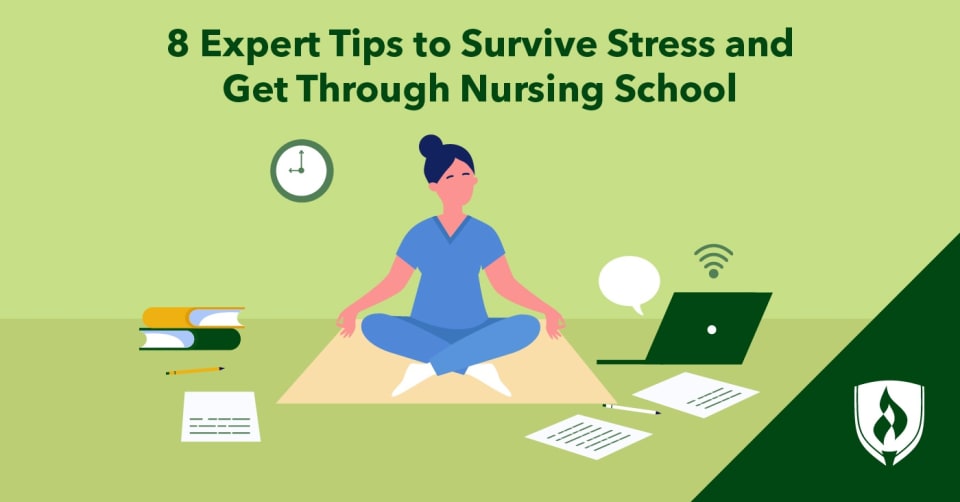18 Effective Ways to Deal with Nursing School Stress

If you are a nursing student, you know how stressful it can be, especially if you are trying to balance school with other responsibilities. To be successful in nursing school, it is necessary to learn how to deal with nursing school stress. In this article, I will share some of my personal experiences with stress from nursing school and as a nursing instructor tell you 18 effective ways to deal with nursing school stress.

Is Nursing School Stressful?
Is it normal for students to be stressed in nursing school, 7 reasons why nursing school is so stressful, 1. transitioning to student life:, 2. financial responsibilities and school expense:, 3. you feel like you are on an emotional roller coaster., 4. failure to plan:, 5. lack of sleep:, 6. studying too much:, 7. feeling like you do not have a support system:, 7 ways nursing school stress can affect your performance and well being, 1. stress can lead to difficulty remembering and processing content., 2. stress can cause changes in your social skills., 3. stress may cause you to experience burnout syndrome., 4. unmanaged stress can lead to poor academic progress., 5. stress can lead to alterations in your immune system’s ability to resist illness., 6. stress, when left uncontrolled, can lead to health issues such as hypertension (high blood pressure)., 7. if stress remains unmanaged, it can affect your self-esteem., how to effectively deal with nursing school stress, 1. get organized nothing screams "stressed" like being disorganized in a program where success demands it., 2. form a study group with classmates., 3. make sure you have a support system outside of school., 4. ask for help, 5. utilize your instructors and academic advisors., 6. do not procrastinate., 7. find a nursing mentor., 8. get into the habit of doing an “after-class recap.”, 9. recognize your stressors., 10. learn to say, “no.”, 11. eat a well-balanced diet., 12. integrate exercise into your daily/weekly routine., 13. make sure you get plenty of rest., 14. take a bubble bath., 15. journal, 16. practice deep-breathing exercises., 17. take a day off from studying., 18. stay focused on the end goal., what are the best stress management resources for nursing students, facebook groups/pages, reddit communities, youtube videos/channels, is nursing school worth the stress, my final thoughts.


- General Categories
- Mental Health
- IQ and Intelligence
- Bipolar Disorder

Nursing School Stress: Effective Coping Strategies for Aspiring Healthcare Professionals
Stethoscopes and sleepless nights intertwine as aspiring nurses navigate the high-stakes gauntlet of medical education, where stress becomes both adversary and teacher on the path to healing others. The journey through nursing school is a demanding and transformative experience that challenges students mentally, emotionally, and physically. As future healthcare professionals, nursing students face a unique set of pressures that can significantly impact their well-being and academic performance.
Recent studies have shown that nursing students experience higher levels of stress compared to students in other academic programs. According to a survey conducted by the American Nurses Association, approximately 82% of nursing students report moderate to high levels of stress during their education. This alarming statistic underscores the critical need to address and manage stress in nursing education.
The importance of tackling nursing school stress cannot be overstated. Not only does it affect students’ academic performance and personal well-being, but it also has long-term implications for their future careers in healthcare. Is nursing stressful? The answer is undoubtedly yes, and learning to manage stress effectively during nursing school can set the foundation for a successful and fulfilling career in this demanding profession.
Common Sources of Nursing School Stress
Understanding the root causes of stress in nursing education is crucial for developing effective coping strategies. Here are some of the most common sources of stress for nursing students:
1. Academic pressures and rigorous coursework: Nursing programs are known for their intensive curriculum, covering a wide range of medical knowledge and practical skills. Students often find themselves grappling with complex subjects, frequent exams, and high academic expectations.
2. Clinical rotations and hands-on training: The transition from classroom learning to real-world patient care can be daunting. Nursing students must quickly adapt to hospital environments, interact with patients, and apply their knowledge in high-pressure situations.
3. Time management challenges: Balancing coursework, clinical rotations, study time, and personal life can be overwhelming. Many students struggle to find enough hours in the day to meet all their obligations.
4. Financial burdens and student loans: The cost of nursing education can be substantial, leading to financial stress and concerns about future debt. Many students work part-time jobs to make ends meet, further complicating their time management.
5. Work-life-study balance: Maintaining relationships, personal health, and extracurricular activities while pursuing a demanding degree can be challenging. Students often feel torn between their academic responsibilities and other aspects of their lives.
Recognizing the Signs of Nursing School Stress
Identifying the signs of stress is crucial for early intervention and management. Nursing students should be aware of the following indicators:
1. Physical symptoms: – Chronic fatigue and exhaustion – Frequent headaches or migraines – Sleep disturbances (insomnia or oversleeping) – Muscle tension and body aches – Weakened immune system leading to frequent illnesses
2. Emotional indicators: – Increased anxiety and worry – Irritability and mood swings – Feelings of overwhelm or hopelessness – Depression or persistent sadness – Emotional numbness or detachment
3. Cognitive effects: – Difficulty concentrating on studies or during clinical rotations – Memory problems and forgetfulness – Decreased problem-solving abilities – Racing thoughts or mental fog – Indecisiveness or second-guessing decisions
4. Behavioral changes: – Procrastination and avoidance of responsibilities – Social withdrawal from friends and family – Increased reliance on caffeine, alcohol, or other substances – Changes in eating habits (overeating or loss of appetite) – Neglecting self-care and personal hygiene
5. Academic performance decline: – Falling grades or difficulty maintaining previous academic standards – Missing deadlines or submitting incomplete assignments – Decreased participation in class discussions – Difficulty retaining new information – Increased test anxiety and poor exam performance
Recognizing these signs early can help nursing students take proactive steps to manage their stress and seek support when needed. Understanding stress overload nursing diagnosis can also provide valuable insights into identifying and addressing stress-related issues.
Effective Stress Management Techniques for Nursing Students
Developing a toolkit of stress management strategies is essential for nursing students to thrive in their academic and clinical environments. Here are some effective techniques to consider:
1. Time management and organizational strategies: – Use digital or physical planners to schedule study time, clinical rotations, and personal activities – Break large tasks into smaller, manageable chunks – Prioritize tasks based on importance and deadlines – Learn to say “no” to non-essential commitments – Utilize time-blocking techniques to maximize productivity
2. Study techniques and learning approaches: – Experiment with different study methods to find what works best (e.g., flashcards, mind maps, group study sessions) – Implement active recall and spaced repetition techniques for better retention – Use mnemonic devices and acronyms to memorize complex information – Take regular breaks during study sessions to maintain focus and prevent burnout – Seek out additional resources, such as online tutorials or study guides, to supplement coursework
3. Self-care practices: – Prioritize regular exercise, even if it’s just a short walk or yoga session – Maintain a balanced diet with nutritious meals and snacks – Establish good sleep hygiene habits, aiming for 7-9 hours of sleep per night – Practice relaxation techniques such as deep breathing or progressive muscle relaxation – Schedule regular “me time” for hobbies and activities you enjoy
4. Mindfulness and relaxation exercises: – Incorporate meditation or mindfulness practices into your daily routine – Try guided imagery or visualization techniques to reduce stress – Practice gratitude journaling to maintain a positive perspective – Use mindfulness apps or online resources for guided exercises – Explore relaxation techniques such as aromatherapy or listening to calming music
5. Building a support network: – Connect with fellow nursing students for mutual support and encouragement – Join study groups or form your own to share knowledge and experiences – Maintain open communication with family and friends about your challenges – Seek mentorship from experienced nurses or faculty members – Participate in nursing student organizations or support groups
Comprehensive stress management strategies for nurses can provide additional insights and techniques that nursing students can adapt to their current situation.
Institutional Support and Resources
Nursing schools and universities often provide various resources to support students’ mental health and academic success. It’s crucial for nursing students to be aware of and utilize these services:
1. Counseling services and mental health resources: – On-campus counseling centers offering individual or group therapy sessions – Teletherapy options for remote or busy students – Crisis hotlines and emergency mental health services – Stress management workshops and support groups – Access to mental health apps or online resources
2. Academic advising and tutoring programs: – Regular meetings with academic advisors to discuss progress and concerns – Peer tutoring programs for challenging subjects – Writing centers for assistance with papers and assignments – Supplemental instruction sessions for difficult courses – Study skills workshops and time management seminars
3. Peer mentoring and study groups: – Formal peer mentoring programs pairing experienced students with newcomers – Student-led study groups for specific courses or clinical specialties – Nursing student associations organizing academic and social events – Online forums or social media groups for sharing resources and advice – Collaborative projects and group assignments to foster teamwork
4. Stress management workshops and seminars: – Regular workshops on topics such as time management, test anxiety, and self-care – Mindfulness and meditation classes tailored for healthcare students – Stress-relief events during high-pressure periods (e.g., exam weeks) – Guest speakers and alumni sharing experiences and coping strategies – Wellness fairs promoting holistic health and stress management resources
5. Financial aid and scholarship opportunities: – Information sessions on financial aid options and loan management – Scholarship databases and application assistance – Work-study programs and on-campus employment opportunities – Financial literacy workshops and budgeting resources – Emergency financial assistance programs for unexpected hardships
How can schools help students with stress is an important question that nursing programs should continually address to support their students effectively.
Long-term Strategies for Coping with Nursing School Stress
Developing long-term coping strategies is essential for nursing students to maintain their well-being throughout their education and future careers. Consider the following approaches:
1. Developing resilience and coping mechanisms: – Practice reframing negative situations to find positive aspects or learning opportunities – Build a toolbox of coping strategies to draw from during challenging times – Seek out experiences that challenge you and help build confidence – Learn from setbacks and view them as opportunities for growth – Develop a strong sense of purpose and connection to your nursing goals
2. Cultivating a growth mindset: – Embrace challenges as opportunities to learn and improve – View mistakes as valuable learning experiences rather than failures – Focus on effort and progress rather than perfection – Seek feedback and use it constructively to enhance your skills – Celebrate small victories and milestones along your nursing journey
3. Maintaining work-life balance throughout your nursing career: – Set clear boundaries between work, study, and personal time – Prioritize self-care and make it a non-negotiable part of your routine – Learn to delegate tasks and ask for help when needed – Practice saying “no” to commitments that don’t align with your priorities – Regularly reassess and adjust your balance as your circumstances change
4. Continuing education and professional development: – Stay curious and open to learning new skills and knowledge – Attend conferences, workshops, and seminars in your areas of interest – Pursue additional certifications or specializations to enhance your career prospects – Engage in lifelong learning to stay current with evolving healthcare practices – Seek out mentorship opportunities to guide your professional growth
5. Advocacy for mental health awareness in healthcare education: – Speak openly about mental health challenges to reduce stigma – Participate in or organize mental health awareness events on campus – Advocate for improved mental health resources and support in nursing programs – Share your experiences and coping strategies with fellow students – Encourage a culture of self-care and mutual support among healthcare professionals
Effective nursing interventions for stress management can provide valuable insights for nursing students to apply both in their own lives and in their future practice.
In conclusion, managing stress in nursing school is a critical skill that can significantly impact both academic success and future career satisfaction. By recognizing the signs of stress, implementing effective coping strategies, and utilizing available resources, nursing students can navigate the challenges of their education with greater resilience and well-being.
It’s essential for aspiring nurses to prioritize their mental and physical health throughout their academic journey. Remember that seeking help is a sign of strength, not weakness. Comprehensive nursing care for patients with altered stress response begins with taking care of oneself.
As you progress through your nursing education, keep in mind that the stress management skills you develop now will serve you well throughout your career. The healthcare profession can be demanding, but with the right tools and mindset, you can thrive both as a student and as a future nurse.
Take action today by implementing some of the strategies discussed in this article, reaching out to your support network, and utilizing the resources available at your institution. Remember, you’re not alone in this journey, and with perseverance and self-care, you can overcome the challenges of nursing school and emerge as a compassionate, skilled healthcare professional ready to make a difference in the lives of others.
References:
1. American Nurses Association. (2021). Nurse Stress and Burnout Survey.
2. Labrague, L. J., McEnroe-Petitte, D. M., Gloe, D., Thomas, L., Papathanasiou, I. V., & Tsaras, K. (2017). A literature review on stress and coping strategies in nursing students. Journal of Mental Health, 26(5), 471-480.
3. Rathnayake, S., & Ekanayaka, J. (2016). Depression, anxiety, and stress among undergraduate nursing students in a public university in Sri Lanka. International Journal of Caring Sciences, 9(3), 1020-1032.
4. Reeve, K. L., Shumaker, C. J., Yearwood, E. L., Crowell, N. A., & Riley, J. B. (2013). Perceived stress and social support in undergraduate nursing students’ educational experiences. Nurse Education Today, 33(4), 419-424.
5. Stephens, T. M. (2013). Nursing student resilience: a concept clarification. Nursing Forum, 48(2), 125-133.
6. Turner, K., & McCarthy, V. L. (2017). Stress and anxiety among nursing students: A review of intervention strategies in literature between 2009 and 2015. Nurse Education in Practice, 22, 21-29.
7. World Health Organization. (2020). State of the World’s Nursing Report – 2020.
8. Yaribeygi, H., Panahi, Y., Sahraei, H., Johnston, T. P., & Sahebkar, A. (2017). The impact of stress on body function: A review. EXCLI Journal, 16, 1057-1072.
Was this article helpful?
Would you like to add any comments (optional), leave a reply cancel reply.
Your email address will not be published. Required fields are marked *
Save my name, email, and website in this browser for the next time I comment.
Post Comment
Related Resources

Undue Stress at Work: Navigating and Overcoming Challenges

Workers’ Compensation Mental Health: Your Rights and Options Explained

Motivation, Emotion, and Stress in AP Psychology: Key Concepts Explained

Pablo’s Exam Stress and Overeating: Understanding the Struggle and Finding…

Plate Boundary Landforms: How Tectonic Stress Shapes the Earth

College Student Stress: Major Causes and How to Cope

Homework Stress: The Hidden Toll on Students and Its Impact

College Student Stress Crisis: Alarming Statistics and Solutions

College Student Financial Stress: A Practical Guide to Managing Money…

Plant Topping and Low Stress Training: Techniques for Maximizing Yields
We use cookies on our website to support technical features that enhance your user experience, and to help us improve our website. By continuing to use this website, you accept our privacy policy .
- Student Login
- Call Us: 888-549-6755
- 888-559-6763
- Search site Search our site Search Now Close
- Request Info
Skip to Content (Press Enter)
8 Expert Tips to Survive Stress and Get Through Nursing School
By Will Erstad on 06/07/2021
- Share on Facebook
- Share on LinkedIn
- Share on Pinterest
- Share on Twitter

It doesn’t take much imagination to understand why nursing school can be stressful. Pressure to invest in a quality degree program, achieve high grades and pass critical licensure exams are only the beginning—then there’s the looming trepidation that comes with working everyday with patients.
Needless to say, there is a lot weighing on the mind of a typical nursing student. There is no way to completely eliminate nursing school stress from your life—in some cases, it could even spur you on to do your best! But there are ways to help alleviate some of the pressure.
Who better to learn from than those who have made it through? We gathered nursing school advice and stress management tips from experienced nurses who handled the experience in stride. Read on to learn more about what can make nursing school stressful—and what you can do to manage it.
Get Your Nursing School Questions Answered at a Nursing Information Session
Reserve Your Spot
What causes nursing school stress?
Nursing school has a reputation for being challenging. Most aspiring nurses don’t embark on their degree program assuming they’re going to skate by doing the bare minimum. The demanding workload is certainly part of the stress equation, but it’s not the only thing to consider.
Nursing school presents a mixture of complicated subject matter to learn, including memorizing unfamiliar medical vocabulary, performing hands-on clinical work, and demonstrating a high-level understanding of nursing ethics and patient care best practices—just to name a few. Traditional study tips can help, but the fact remains that nursing students have to master a wide array of topics.
On top of this, many nursing students dive so far into their studies, they feel as though they’re in a bubble. “Classes are intense, and workloads are heavy. This leaves very little time to socialize and have fun,” says Alaina Ross, registered nurse (RN) and expert contributor to Test Prep Insight . “This social isolation can compound any school-related stress you're feeling.”
8 Tips for surviving nursing school stress
You get the picture: Nursing school won’t always be a walk in the park. But that doesn’t mean you need to live with nursing school stress for the duration of your program! Use these “survival” tips from nurses to lighten the load of nursing school.
1. Develop a routine
Nursing school is a marathon, not a sprint. You’ll burn out quickly if you approach your studies without a plan.
“The most stressed-out nursing students I saw were the ones that tackled each day without a plan,” Ross says. “Having a set routine will help you stay focused and get through each day,” Ross says.
She recommends plotting out chunks of your day for different tasks, such as reviewing flashcards, completing homework or meeting with a study group. Don’t forget to include time for exercise, cooking a nourishing meal and relaxing!
2. Practice an after-class recap
Don’t wait until an exam is looming to start studying! Reviewing the most important material soon after your class is over can help you solidify what you’ve learned. This can help keep the list of things you need to extensively review and master much more manageable. Reviewing your notes shortly after a class is not only a great way to reinforce what you’ve just learned but also a way to identify gaps in your understanding so you can ask for clarification—without it being the night before a test.
3. Find a solid study group
Meeting with a study group offers a fresh way to review information beyond flipping through flashcards alone. A study group that meets weekly can compare notes, demonstrate skills and practice NCLEX-style questions that can be difficult to tackle on your own.
Having other students to lean on through nursing school is important for the social support as much as for actual studying! Dr. Jenna Liphart Rhoads, a nurse and educator at NurseTogether.com , shares that “making a friend in my nursing program who mirrored my outside life, study style and goals were the most helpful for getting through nursing school.”
A study group can solve two potentially stress-causing problems at once by providing both social and academic support. For nursing students who are short on time, that’s a win-win!
4. Mix exercise into your study sessions
When you feel your stress levels spiking, get moving! While exercise has long been a solid outlet to help relieve stress and anxiety, it can also boost your ability to retain the information you’re studying. Regular exercise can promote factors that promote mental acuity—like less stress-induced mental fog. 1
In the right circumstances, you may even be able to reap the benefits of exercise while studying. A long brisk walk with nursing school classmates where you discuss course materials or quiz each other with flashcards can be an excellent way to accomplish both.
Then again, getting active can also just be a way to push everything else on your plate aside—and that’s OK! Exercise can also provide a valuable break from nonstop studying. “Exercise helped me process the emotional situations that are a part of nursing school, take a mental break from studying and learning and keep my body healthy, which helped my mental health,” Liphart Rhoads says.
5. Eat well and nourish your body
While your health and sanity might be able to endure a short period of exhaustion, caffeine and on-the-fly meals, your performance will plummet as the months add up. “Never forget the mind-body connection,” says Sarah Johnson, RN and health ambassador at Family Assets .
Eating well is a crucial part of reducing stress, such as whole grains like oatmeal or quinoa that can release calming chemicals in the brain. 2 However, it can be particularly difficult to eat well during nursing school because high stress can cause people to overeat unhealthy comfort foods. 3 Start by making simple swaps, like reaching for carrots and hummus instead of potato chips during a study session.
Think of eating well as an investment in your nursing career. It will help you bring your best game, sustainably, throughout nursing school and beyond. “Treat your body well, and you will be better equipped psychologically to deal with the stress,” Johnson says.
6. Rely on your support system
Don’t get so absorbed in nursing school that you forget to connect with those who want to cheer you on along the way. Make time for regular catch-up conversations, share your struggles and successes, and accept help if it’s offered, such as ready-made meals or quizzing you before a big test.
“Leverage your network of family and friends to keep you positive and upbeat,” Ross says. “Call your parents on your commute to and from school, and catch up with friends over texts at lunch. These quick talks will help you stay positive and put a smile on your face.”
7. Ask for help
No one said you have to do nursing school all on your own. In addition to social support from friends and family, academic help is available right in the midst of your nursing school experience. Do not hesitate to reach out and ask for help—remember, no one involved with your nursing education wants you to fail.
Talk to your professors via email or during office hours if there are concepts you need help understanding. Ask a librarian if you’re struggling to find the right resource or need help conducting research. Ask a classmate to compare notes if you’re struggling to recall what you meant when you jotted something down.
There’s no bonus to going through nursing school in isolation. Keep an eye out for opportunities to ask for help from others!
8. Seek out peer support
Family and friends aren’t the only ones who can support you through nursing school. Getting official academic support can be just as much of a boost! A good nursing program will offer plenty of options for academic help if you know where to look.
For example, you can seek out help through the peer tutoring and peer mentoring programs at Rasmussen University. These academic support programs can match you with a student tutor or mentor who has is qualified to help you improve your study habits and work through any academic areas you need assistance with.

You can get through nursing school
Whether you’re still considering a career in nursing or you’re already halfway through your degree program, follow these stress management tips to help keep nursing school stress at bay. Still looking for more resources? Find some more nursing student resources here.
Of course, navigating nursing school is only the tip of the iceberg when it comes to potentially stressful situations you’ll encounter on the way to becoming a nurse. Another factor that may be looming large? The NCLEX® licensure exam awaiting you after graduation. Fortunately, we’ve got you covered—our article “ Nurses Share 13 NCLEX Exam Tips That Helped Them on Exam Day ” can help you get prepared.
1 “Healthbeat: Exercising Can Boost Your Memory and Thinking Skills” Harvard Health Publishing. February 15, 2021 [accessed May 2021] https://www.health.harvard.edu/mind-and-mood/exercise-can-boost-your-memory-and-thinking-skills 2 Dr. Craig Sawchuk “Coping with Anxiety: Can Diet Make a Difference?” Mayo Clinic. May 24, 2017 [accessed May 2021] https://www.mayoclinic.org/diseases-conditions/generalized-anxiety-disorder/expert-answers/coping-with-anxiety/faq-20057987 3 Harvard Health Publishing, “Harvard Mental Health Letter: Why Stress Causes People to Overeat” February 15, 2021 [accessed May 2021] https://www.health.harvard.edu/staying-healthy/why-stress-causes-people-to-overeat NCLEX is a registered trademark of the National Council of State Boards of Nursing, Inc. EDITOR’S NOTE: This article was originally published in January 2014. It has since been updated to reflect information relevant to 2021.
Request More Information
Talk with an admissions advisor today.
Fill out the form to receive information about:
- Program Details and Applying for Classes
- Financial Aid (for those who qualify)
- Customized Support Services
- Detailed Program Plans
There are some errors in the form. Please correct the errors and submit again.
Please enter your first name.
Please enter your last name.
There is an error in email. Make sure your answer has:
- An "@" symbol
- A suffix such as ".com", ".edu", etc.
There is an error in phone number. Make sure your answer has:
- No dashes, slashes or spaces
- No country code (e.g. "1" for USA)
- No numbers starting with "0" or "1"
There is an error in ZIP code. Make sure your answer has only 5 digits.
We offer tuition savings for many employers—see if yours is one of them.
Please enter Corporate Employer.
Can’t find your employer? Select "Other Employer Not In List" or "Not Employed".
Please choose a School of study.
Please choose a program.
Please choose a degree.
The program you have selected is not available in your ZIP code. Please select another program or contact an Admissions Advisor (877.530.9600) for help.
The program you have selected requires a nursing license. Please select another program or contact an Admissions Advisor (877.530.9600) for help.
Rasmussen University is not enrolling students in your state at this time.
By selecting "Submit," I authorize Rasmussen University to contact me by email, phone or text message at the number provided. There is no obligation to enroll. This site is protected by reCAPTCHA and the Google Privacy Policy and Terms of Service apply.
About the author
Will Erstad
Will is a Sr. Content Specialist at Collegis Education. He researches and writes student-focused articles on a variety of topics for Rasmussen University. He is passionate about learning and enjoys writing engaging content to help current and future students on their path to a rewarding education.

Posted in General Nursing
- nursing education
Related Content

Alex Sher | 11.21.2024

Alex Sher | 11.05.2024

Hope Rothenberg | 10.03.2024

Brianna Flavin | 05.07.2024
This piece of ad content was created by Rasmussen University to support its educational programs. Rasmussen University may not prepare students for all positions featured within this content. Please visit www.rasmussen.edu/degrees for a list of programs offered. External links provided on rasmussen.edu are for reference only. Rasmussen University does not guarantee, approve, control, or specifically endorse the information or products available on websites linked to, and is not endorsed by website owners, authors and/or organizations referenced. Rasmussen University is accredited by the Higher Learning Commission, an institutional accreditation agency recognized by the U.S. Department of Education.
- 801.816.1444
How to Deal With Nursing School Stress
Statistically, nursing school is stressful. Psychological studies have found it’s more stressful than just about any other academic program—including, some studies say, medical school. The reasons why makes sense. Like with any medical program, you have to learn a huge amount of information fully and quickly, in addition to juggling personal/family responsibilities. The clinical experience on top of all this, though, is what makes nursing students stand apart. After classes, after homework and studying, after taking care of your kids or parents or both, you have clinicals, which can demand all of your mental, physical, and emotional energy.
Nursing school requires a lot, so avoiding stress entirely just isn’t always realistic. Some days you have to accept the reality of nursing school stress, but you can always stress less, and sometimes defeat it entirely with a few techniques.
1. Practice Self Care Ritually
“Self-care” doesn’t mean what it’s sometimes used for—skipping class to watch rom coms in bed. Though that indulgence might relieve a little stress in the moment, in the long-run, trying to catch up on missed material will only exacerbate the problem.
Real self-care isn’t an excuse to be irresponsible, but a reminder to attend to your own physical, emotional, and spiritual needs. This is always important, and somehow it seems to be easiest to forget when you’re immersed in the study and practice of caring for others. Nursing students have to remember to take care of themselves and making that a priority.
Given your time commitments, new demands, and a hundred new terms to memorize every week, you may not be able to “take care of yourself” by doing things like drawing a hot bath for an hour every night, but you can and should sleep enough, eat right, and exercise in the midst of nursing school. In fact, this proper self-care will help alleviate nursing school stress, or at least can keep it from getting worse.
Related Resource: How to Prepare for Nursing School
2. Schedule Your Sleep
People organize their lives and work in myriad ways, and no one way is better than another—but some kind of organization is essential for reducing the stress of nursing school. Whether it’s with Google Calendar, sticky notes on your bathroom mirror, or a color-coordinated daily planner, you need to create and stick to a schedule for managing your study, class, sleep, and personal time. Nursing school stress often arises from feeling like you have a million things to do, and worrying that you won’t get them done. You might actually have close to a million things to do, but you can get them done, and a visible, functional schedule will assure you of that.
3. Forgive Yourself During Clinicals
Clinicals tend to be the most stressful part of nursing school. The moment the information you learned is put into practice, you’re going to feel the weight of responsibility, the fear of making a mistake, and all the stresses that nurses have to deal with on a daily basis. As you’re learning a new role, you’re also learning how to tactfully deal with angry and demanding patients, how your current hospital or field site operates, and how to work alongside staff. It’s demanding, but instead of buckling under the pressure, one way to stress less is by forgiving yourself.
You’re not going to be a perfect nurse overnight. You won’t even be a perfect nurse by the end of your first clinical rotation. Nursing is a profession that requires a lot of knowledge and experience, and clinicals are a time to provide both. You might be expected to be perfectly patient and knowledgeable in your first nursing job (but even there a lot of administrators have some grace). In clinicals, you’re there to learn, and so it’s important to forgive yourself for the small errors you make and the things you forget.
4. Remember the End Goal
If you feel completely exhausted and brain-dead at some point during nursing school, you may start to question why you’re even there, and if the education is worth it. This is natural, but despairing can make stress worse, not better. The real solution is to answer that question: Why did you decide to become a nurse?
Was it to provide for your family?
Was it to have a career that helped and sometimes saved lives?
Was it because a nurse positively affected your life—or a family member’s?
Every nursing student will answer this question in a different way, but no one decides to go to nursing school because they think it will be a breeze. Everyone expects hard work and yet chooses to become a nurse anyway. Remembering your choice will keep you motivated and keep things in perspective, which helps combat stress.
5. Communicate With Others
It’s tempting to go into isolation when you’re stressed. With a full class schedule, clinical, sleep, and the looming NCLEX, nursing school stress will make you feel like you never have time for anyone, but this is not the case. While it might be harder to carve out the time for others, time with loved ones and peers is as essential as ever. You need emotional support when you’re in nursing school, and you need some camaraderie that only comes from talking with other students. If you’re feeling a lot of stress, there’s a good chance they are too. Just knowing you’re not the only person who feels overwhelmed can bring some relief and reduce some of that stress.
Whether you’re beginning your healthcare journey with our associate of science in nursing program , (where you can become a registered nurse in as little as 20 months) pursuing a 3 year BSN degree or accelerated BSN program , advancing through our RN to BSN program , or reaching higher with an MSN degree , discover which nursing pathway aligns with your career goals by exploring our nursing school.
- Nursing School
- Stress Management
- Student Experience
Related Articles
10 Best Study Space Tips
Nursing school is filled with tough coursework, challenging exams, and hands-on clinicals. Critical information to learn, memorize, and practice are...
What Can You Do With a BSN?
Top 10 Reasons You Need Your BSN Degree Bloomberg recently reported on the growing need for nurses in the U.S.—and...
Time Management Tips for Students
It’s easy to get overwhelmed by the responsibilities of juggling work, family, and the demands of school. The busier we...
9 Facts About Our RN to BSN Completion Program
One of the many benefits of working as a nurse is that there is always an opportunity to grow and...
Why You Need a CCNE Accredited Nursing Program
Choosing a nursing school is exciting, and you want to make sure that you’re going to a good one. But...
How to Reduce Stress and Anxiety When Preparing for the NCLEX
As one of the most pivotal academic challenges any aspiring nurse will face, the National Council Licensure Examination- Registered Nurse...

- Request Info
- Virtual Tour
Shortcuts for
- Prospective Students
- High School Students or Educators
- Alumni & Friends
- Areas of Study
- Degree Types
- View All Programs
- University Catalog
- Student Support & Resources
- College of Health Sciences
- Undergraduate Admissions
- Graduate Admissions
- Transfer Students
- International Admissions
- Tuition & Fees
- Financial Aid & Scholarships
- Accepted Students
- Early College Program
- About Our Campus
- Housing & Dining
- Student Health & Wellness
- Student Activities & Recreation
- Campus Visits, Tours & Open Houses
- Workforce Development
- Employer Resources
- News & Media
- Safety & Security
- Public Disclosure
- Commencement 2024
Home Blog How to Reduce and Deal With Nursing School Stress
How to Reduce and Deal With Nursing School Stress
According to the Bureau of Labor Statistics , there will be over 3,400,000 nurses working within the United States by 2028. Of course, before becoming a registered nurse , these individuals will have to complete nursing school — a notoriously challenging program to complete. Resources like The 9 Circles of Nursing School Hell and How to Stay Motivated During Nursing School further underscore this point. Fortunately, there are ways to cope and emerge as a successful professional in the field. Keep reading for important tips to reduce nursing school stress.
Why Is Nursing School So Stressful?

It’s important to recognize that nursing school comes with a whole lot of work. School curriculum cover a wide range of subjects including physiology, chemistry, microbiology, statistics, sociology, math and more. It’s not uncommon for nursing students to pull all-nighters in attempts to get through all the material assigned.
Internships and certification hours add even more to the plate. These experiences will introduce nursing students to a world of injury, illness, trauma and suffering. This initial exposure may become overwhelming to first-time students.
Associate’s degree programs typically take around two years to complete while bachelor’s degree programs take four.
Still, how long nursing school lasts is just one part of the equation. Nursing students must be prepared to handle stress during the course of the journey.
How to Handle The Stress of Nursing School
How do nursing students cope with stress? The answer depends on who you ask. Check out our list below for some easy techniques to help minimize stress when in school.
Maintain a Schedule
Nursing school throws a lot at you, which means it’s important to remain organized. Minimize stress by setting a schedule. This will help manage your school work along with important everyday tasks. Start by looking at your school schedule. From there, you can figure out how many hours a day you need to designate to study time, personal time, and sleep!
Create a Study Group
Understand that you’re not in this alone. There is an entire school full of students out there able to relate to what you’re going through. Reach out to them for support. Unpack lecture topics as a group. Compare notes, quiz each other on important topics and prepare for exams in person. It’s also a great way to pepper in a little social time while studying!
Review Your Notes After Class
We know, the last thing you likely feel like doing after a long day of class is reviewing your notes. But setting apart some time each day to go over what you’ve learned could save you when it comes to preparing for tests. Cramming for exams is stressful. The more you can retain throughout the semester, the less time you have to pack into the days leading up to major assessments.
Reach Out to Your Professors
When attending a large nursing school, it’s easy to feel as though you’ve been swallowed up by the crowd. Remember, your professors are there to support you. Reach out to them outside of class to get better acquainted. Ask questions and don’t be afraid to rely on them as a resource.
Get Some Physical Exercise
It’s true; as a nursing student you will have an enormous amount of work to get through. Still, it’s important to practice self care throughout the program. Make sure you carve out enough time for some exercise every day. If you’re really strapped for time, take your study group on the road and discuss important topics while out for a walk! In the end, it will help you maintain your focus and get through study materials faster.
Find Time For Simple Pleasures
Of course, self care expands far beyond exercise! Before calling it a night, try to de-stress by squeezing in some time for something you love, whether it’s a good book, your favorite TV show, or simply getting into a hot bath. You don’t have to commit for an inordinate amount of time, just whatever you can afford!
You can also look into things that bring you joy without taking you away from your school work. Head to your favorite coffee shop to study and treat yourself to a special drink. Grab yourself a new piece or art to put up in the house. Maybe take home a new house plant to enjoy!
Maintain a Healthy Diet
There are two things that a good majority of nursing students lack: time and money. That combination can wreak havoc on a diet, with many students turning to cheap and ready-made meal alternatives.
Keep a Journal
Don’t let racing thoughts keep you up at night. Jot them down in a journal and dismiss them before bed. It may seem like a hard sell to the cynics out there, but journaling has been shown to decrease feelings of stress and anxiety. It will also provide an easy-to-reach location to store important notes and reminders.
Go Easy On Yourself
There will inevitably be moments where you don’t perform as well as you would hope. Forgive yourself. Remember, nursing school is a journey that cannot be completed without making a few small errors along the way. Think of these moments as teachable experiences. Try not to stress. Learn from it, and move on instead.
Begin Your Nursing Career With the New England Institute of Technology

How long is nursing school? It’s an important question to consider, especially considering the amount of stress it can introduce! The Associate Degree Program in Nursing at on of the best nursing school New England Institute of Technology can be completed in as little as 18 months.
The program offers clinical and laboratory experiences as well as classroom learning to help you tend to diverse populations. Students will acquire clinical skills and high developed judgement skills throughout the program and be prepared for employment in a hospital, healthcare clinic, nursing home or outpatient facility.
Students will also develop high-tech and decision-making skills required to provide high quality care. They will have the opportunity to train in our fully equipped labs, stocked with the latest nursing simulation technologies.
We also offer a Registered Nurse to Bachelor of Science in Nursing (RN to BSN) program online to help working nurses further their positions. Recently, the program was ranked 25th in the U.S. in “Top 50 Best Value Online RN to BSN Programs 2017” by Value Colleges. We should also mention that our tuition rates fall below those of most other bridge programs across the country.
All classes are taught by faculty who are experienced professionals and clinicians who make sure the syllabus remains up-to-date and relevant to today’s dynamic healthcare environment.
Both nursing programs are accredited by the Accreditation Commission for Education in Nursing (ACEN). You can begin the application process for our associate and bachelor’s degree programs by filling out this form. You can also find out more information by calling us at 855-899-1497.
Related Articles –
- How hard is nursing school
- What can you do with master’s in nursing
Registered Nurse RN
Registered Nurse, Free Care Plans, Free NCLEX Review, Nurse Salary, and much more. Join the nursing revolution.
How to Manage Stress While in Nursing School
Prospective nursing students may ask themselves “How stressful is nursing school?” and “Is nursing school really as hard as everyone says it is?”. Students who choose to attend nursing school make wise decisions, but the decisions do not come without some consequences. Nursing school students have a vast number of responsibility that they may or may not know how to handle. Stress is one of the biggest problems that nursing students have. Managing their stress is at the center of their success in nursing school.
Stress You Will Encounter While in Nursing School
Attending nursing school comes with stress that students must manage if they want to be successful in their respective programs. Stress can come in different forms for different students, but the following are a few of the stressors that students will experience in nursing school.
- Grades – Students must maintain a certain GPA in order to stay in their respective nursing programs. It can be very stressful for students since they may have to compete for positions in their nursing programs with other nursing students.
- Study Sessions – It may be necessary for students to study for 4 hours or more per day for their nursing classes. It can be stressful to balance studying, attending classes, and maintaining their personal lives.
- Clinical Experiences – Students can expect to cram a great deal of knowledge and time into their clinical experiences. Their opportunities to gain hands on experience may cause a great deal of stress.
- Finances – Attending nursing school can be very stressful. Many students have to juggle working a job and attending nursing school, which can cause additional stress.
Consequences of Stress While in Nursing School
The consequences of stress on nursing students are endless. Stress affects students in the following ways:
- They may experience health issues. Stress can bring about health problems that range from anxiety to headaches. They may experience changes in their mood that will affect them in school. It is very important that these nursing school students take good care of their health.
- Their grades may suffer. Maintaining grades is one of the most important things that students must do in nursing school. Failing courses and making low grades affect their ability to succeed in their nursing program.
- They may have problems sleeping. Those suffering from stress may have difficulty sleeping, which can cause huge problems. Sleep deprivation can cause nursing school students to miss study time, fail tests and exams, perform poorly during their clinical experiences, and much more.
List of Ways on How to Manage Stress While in Nursing School
The great thing about stress is that it is manageable. Nursing school students must exercise stress management techniques if they want to be successful in their programs. The following are ways to manage stress while in nursing school:
- Exercise – This is one of the greatest stress relievers. Exercising for 20 minutes or more three or more times per week can help nursing student manage their stress.
- Quiet Time –Sometimes it is good just to get some time away from everything. Students need to designate a portion of their day to doing something for themselves so that they prevent stress.
- Sleep – Studies show that people need at least 8 hours of sleep per day. Getting enough sleep can help students succeed in nursing school.
- Manage Time – Students should set realistic goals for how they need to spend their time in nursing school. Time management is at the center of their success.
Stress comes with nursing school so it is important for students to find ways to decrease their daily stressors. Managing and balancing time is one of the most important things that nursing school students can do while in school.
Thinking about going to Nursing School?
Are you contemplating going to nursing school, or are you actually in nursing school right now? Nursing school can be challenging, especially if you do not know what to expect. Here is a great guide by S. L. Page BSN, RN called “ How to Pass Nursing School “. This book gives you detailed information about how to pass nursing school from beginning to end. S.L. Page, the creator of this website, complied all the information students what to know about nursing school into one easy to read guide. She gives in depth information on how to succeed in nursing school.
S.L. Page graduated from nursing school with honors and passed the NCLEX-RN on her first try. In this eBook, she reveals the strategies she used to help her succeed.
Here is what the book looks like:

Please Share:
- Click to print (Opens in new window)
- Click to share on Facebook (Opens in new window)
- Click to share on Twitter (Opens in new window)
- Click to share on Pinterest (Opens in new window)
- Click to share on Reddit (Opens in new window)
- Click to share on LinkedIn (Opens in new window)
- Click to share on WhatsApp (Opens in new window)
- Click to share on Pocket (Opens in new window)
- Click to share on Telegram (Opens in new window)
Disclosure and Privacy Policy
Important links, follow us on social media.
- Facebook Nursing
- Instagram Nursing
- TikTok Nurse
- Twitter Nursing
- YouTube Nursing
Copyright Notice

IMAGES
VIDEO
COMMENTS
Many people underestimate the importance of relying on a support system while in nursing school. If you try to go it alone, you can quickly feel overwhelmed. Later, I will give you some tips on developing a solid support system to help reduce nursing school stress. 7 Ways Nursing School Stress Can Affect Your Performance and Well Being
Nurses can role-model these behaviors for patients, and nurse leaders (such as faculty) can do the same for students. Nursing school administrators, faculty, and staff must focus attention on the curriculum as one way to promote student wellness. ... I tell them that I run to manage stress. During this informal conversation, many students share ...
Here are some simple self-care activities you can try to alleviate nursing school stress: Take a soothing bath. Order a box of bath bombs, so you have a reason to soak in the tub as much as possible. Try yoga. This discovery is what saved me in nursing school and gave me great focus. Meditate. There are so many free mediations to try on YouTube.
The answer is undoubtedly yes, and learning to manage stress effectively during nursing school can set the foundation for a successful and fulfilling career in this demanding profession. Common Sources of Nursing School Stress. Understanding the root causes of stress in nursing education is crucial for developing effective coping strategies.
Read on to learn more about what can make nursing school stressful—and what you can do to manage it. ... 8 Expert Tips to Survive Stress and Get Through Nursing School. By Will Erstad on 06/07/2021 Share on Facebook; Share on LinkedIn; Share on Pinterest ...
How Stress and Mental Health Issues Can Manifest in Nursing School. Nursing school is a demanding academic program that requires students to cope with significant levels of stress and pressure. Stress and mental health issues can be reflected in diverse ways in nursing students, affecting their physical, emotional, and academic well-being.
3. Forgive Yourself During Clinicals. Clinicals tend to be the most stressful part of nursing school. The moment the information you learned is put into practice, you're going to feel the weight of responsibility, the fear of making a mistake, and all the stresses that nurses have to deal with on a daily basis.
While the program has its challenges, staff and faculty offer an environment of inclusiveness, one-on-one support, and collaboration to help you cope with nursing school stress and, most importantly, find success. Here are seven stress-relief techniques you can count on during your nursing education. 1. Make Self-Care a Priority
According to the Bureau of Labor Statistics, there will be over 3,400,000 nurses working within the United States by 2028.Of course, before becoming a registered nurse, these individuals will have to complete nursing school — a notoriously challenging program to complete.Resources like The 9 Circles of Nursing School Hell and How to Stay Motivated During Nursing School further underscore ...
Sleep deprivation can cause nursing school students to miss study time, fail tests and exams, perform poorly during their clinical experiences, and much more. ... The following are ways to manage stress while in nursing school: Exercise - This is one of the greatest stress relievers. Exercising for 20 minutes or more three or more times per ...